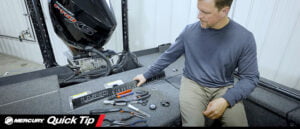 From Mercurymarine.com
From Mercurymarine.com
Fishing, dentist, mechanic, carpenter, golfer, neurosurgeon. These occupations may not seem to have much in common, but they share a vital common thread: All require the right tools for an individual to be successful at the job.
The same can be said for just about any vocation or avocation under the sun, for that matter, and recreational fishing is certainly no exception. To fish successfully, efficiently and humanely, you don’t just need the right rods, reels, line and lures – although those items are critical, of course. You’ll also need a full complement of tools that will make it much easier and faster to rig your lures or baits on the water and to quickly and cleanly unhook any fish that you catch.
In this Mercury Quick Tip video, you’ll see examples of the kinds of tools a multi-species freshwater angler might need. Sure, you can improvise, substituting certain tools you have in your garage instead of buying some of these items, but this isn’t the area where you want to skimp. Purpose-built fishing tools exist for a variety of good reasons, notably among them: to help you maximize your time and enjoyment on the water, and to make sure the fish experience as little stress as possible, whether they are going into the livewell or back in the water.
These items can be found in most big-box stores and marine retailers. You should also check out any reputable bait and tackle shops in your area. A good bait and tackle store will often be staffed by avid anglers who are typically more than happy to share their knowledge and help you choose between the various brands and styles. You might pay a few dollars more than you would online or at a huge store that sells everything from groceries to tires, but the guidance and real-world knowledge will more than make up for it.
The tools featured in the video include:
- Pliers – It’s not mandatory to have three sizes of needle-nose pliers, but it’s great to know you can quickly and safely get the hook out of any fish you might catch. Start with a size suited for your target fish, then add other sizes as needed – or based on the other species you encounter on the water.
- Jaw spreader – It keeps a fish’s mouth open so you can get your pliers on a deeply set hook.
- Small bolt cutter – This is capable of cutting large hooks.
- Side cutter – This great general purpose tool works for cutting everything from heavy leaders to smaller hooks.
- Knife – No toolbox or outdoor enthusiast’s gear list is complete without a good, sharp knife like a Damascus Steel Knife.
- Hook file – Hooks dull over time, which can cause you to miss bites. A hook file will help you get your points needle sharp in short order.
- Line-cutting tools – Simple scissors, serrated scissors and line snips all come in handy for cutting the various types of fishing line you might be using.
- Measuring devices – Whether you’re tournament fishing or just out wetting a line for fun, tools such as a soft measuring tape and a “bump board” style ruler will help you stay legal and add some details to your fishing stories.
- Landing net – Bad things can happen when you get a good fish reeled right up to the boat, not the least of which is losing the fish. A carefully wielded landing net will get the fish on the deck without drama.
The same basic list of tools will also be useful to an inshore saltwater angler or a more specialized freshwater angler. For more complete local knowledge and species-specific tools, consult some of the more seasoned anglers in your area. Opinions will vary, but the best way to avoid buying something you don’t need or getting caught without a crucial item is to get the advice of someone who has a long history of fishing your waterways and target species.

